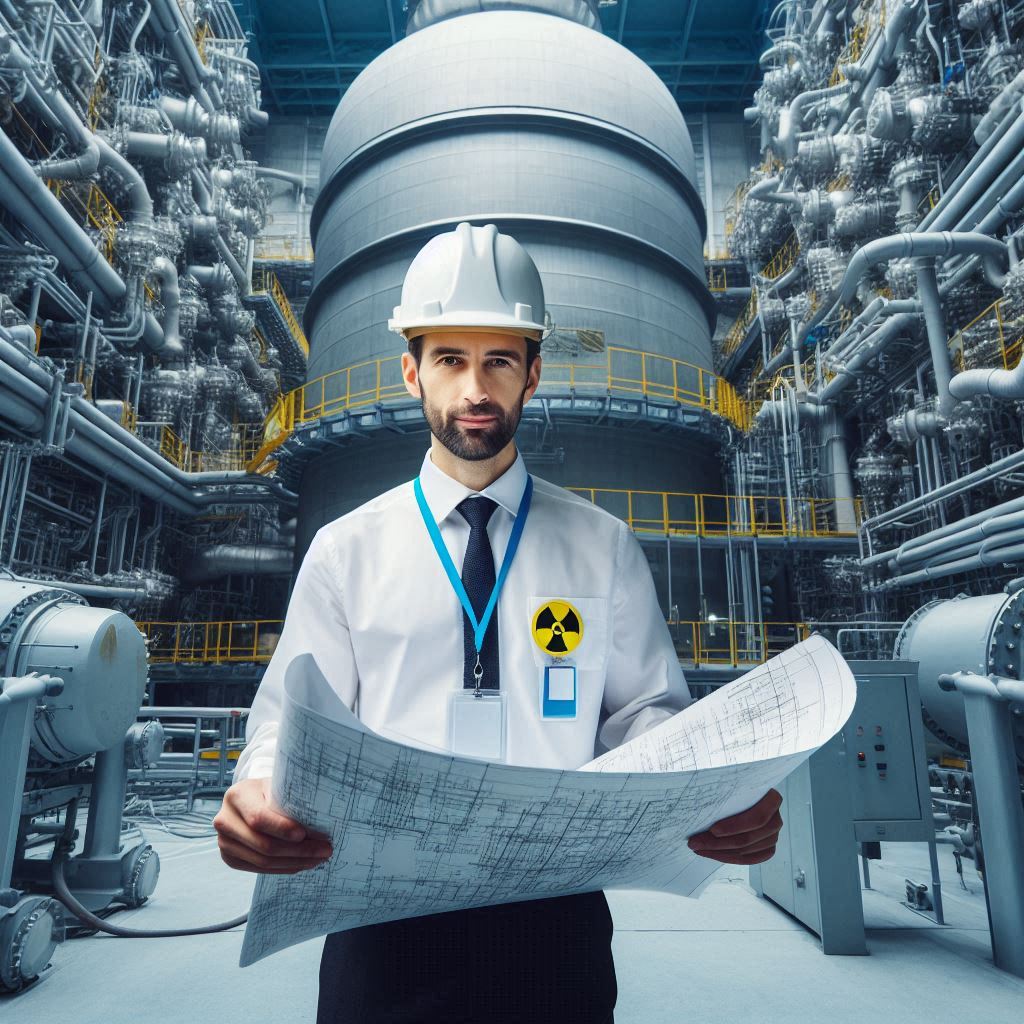Introduction
Nuclear engineering in the military is a specialized field that blends advanced technology with strategic defense applications.
This area of engineering focuses on harnessing nuclear processes to enhance military capabilities and secure national interests.
Nuclear Engineering in the Military
Nuclear engineering in the military involves the design, development, and maintenance of nuclear systems used in defense.
This includes nuclear-powered naval vessels, weapons systems, and advanced propulsion technologies.
Engineers in this field work on the safe and effective use of nuclear energy for strategic purposes.
Overview of the Importance of Nuclear Engineering in the Military
Nuclear engineering is crucial for national defense.
It enables the operation of nuclear submarines, provides energy security, and contributes to advanced weaponry.
The technology ensures that military forces remain competitive and effective in various scenarios.
Preview of Opportunities and Challenges in the Field
The field offers significant opportunities, including innovation in propulsion and energy systems.
However, it also presents challenges such as managing safety concerns, adhering to stringent regulations, and addressing environmental impacts.
Balancing these factors is key to advancing military nuclear technology.
Importance of Nuclear Engineering in the Military
Nuclear engineering plays a crucial role in the military by providing advanced technology and strategic capabilities.
The integration of nuclear technology enhances various aspects of military operations and infrastructure.
It supports national defense through both power generation and the development of advanced weaponry.
Military nuclear engineers work to ensure that nuclear technology is used safely and effectively, contributing significantly to national security and defense.
How Nuclear Technology Enhances National Security
Nuclear technology enhances national security in several key ways.
Ractors provide reliable power for military bases and operations, enabling sustained activity in remote areas.
Nuclear submarines, equipped with nuclear propulsion systems, allow for extended underwater missions and strategic deterrence.
These submarines can operate for months without refueling, maintaining a significant tactical advantage.
Additionally, nuclear technology contributes to advanced weapon systems and defense mechanisms, strengthening overall military readiness and capability.
The Role of Nuclear Engineers in Maintaining and Improving Military Infrastructure
Nuclear engineers are vital in maintaining and improving military infrastructure.
They oversee the operation and safety of nuclear reactors used in submarines and land-based facilities.
These engineers ensure that reactors run efficiently and remain in compliance with safety regulations.
They also work on upgrading and modernizing nuclear systems to incorporate the latest technologies.
Their role includes troubleshooting issues, performing regular maintenance, and implementing enhancements to keep military assets operational and effective.
How Nuclear Engineering Contributes to Defense Strategies
Nuclear engineering contributes to defense strategies by providing critical capabilities for deterrence and advanced defense systems.
Nuclear-armed submarines and strategic missile systems form the backbone of a country’s deterrence strategy, helping to prevent potential threats.
Nuclear engineers develop and maintain these systems, ensuring their reliability and effectiveness.
Additionally, nuclear technology supports the development of advanced sensors and monitoring systems for detecting and responding to potential threats.
This technological edge helps shape and enhance national defense strategies, ensuring a strong and secure military posture.
In summary, nuclear engineering is essential to the military, enhancing national security through advanced technology and infrastructure.
Nuclear engineers play a key role in maintaining and improving military systems, and their work directly contributes to effective defense strategies.
By integrating nuclear technology, the military gains significant strategic advantages, ensuring robust defense capabilities and operational readiness.
Read: Aerospace Engineering in Commercial Spaceflight
Opportunities in Nuclear Engineering in the Military
Career Paths for Nuclear Engineers in the Military
Nuclear engineering offers diverse career paths in the military, each with unique responsibilities and opportunities.
Engineers can work on nuclear propulsion systems in submarines and aircraft carriers, ensuring their efficiency and safety.
They can also be involved in the development and maintenance of nuclear weapons systems, contributing to national defense strategies.
Another path includes working with nuclear reactors at military bases, ensuring their safe and efficient operation.
Additionally, opportunities exist in research and development roles, focusing on advancing nuclear technology for military applications.
Benefits of a Career in Nuclear Engineering
A career in nuclear engineering in the military provides several key benefits.
Job security is a significant advantage, as the demand for skilled engineers remains high due to ongoing technological advancements and national security needs.
Military nuclear engineers often enjoy competitive salaries and comprehensive benefits packages.
Advancement opportunities are plentiful, with clear career progression paths leading to leadership and specialized roles.
Engineers can also gain valuable experience in cutting-edge technologies and contribute directly to national defense, offering a sense of purpose and achievement.
Specialized Training and Education Programs
Aspiring military nuclear engineers can benefit from specialized training and education programs.
These programs typically include a combination of formal education, such as degrees in nuclear engineering or related fields, and practical military training.
The military often provides training programs that cover reactor operations, nuclear safety, and weapons systems.
Advanced courses and certifications are available for those seeking to specialize further or move into leadership roles.
Additionally, on-the-job training and continuous professional development help engineers stay current with emerging technologies and best practices.
In summary, nuclear engineering in the military offers a range of career paths with significant benefits, including job security and advancement opportunities.
Specialized training and education programs prepare engineers for success in this field, equipping them with the skills needed to excel.
As military technology evolves, the role of nuclear engineers becomes increasingly important, offering rewarding and impactful careers.
Read: Essential Aerospace Engineering Textbooks
Challenges in Nuclear Engineering in the Military
Potential Risks and Safety Concerns
Nuclear engineering in the military involves managing several significant risks and safety concerns.
One major issue is the potential for accidents or malfunctions in nuclear reactors, which can lead to hazardous situations.
Ensuring the safety of nuclear propulsion systems and reactors requires rigorous maintenance and oversight.
Additionally, the handling and storage of nuclear materials pose risks of contamination and security breaches.
Engineers must implement stringent safety protocols and constantly monitor systems to mitigate these risks and prevent incidents that could have severe consequences.
Ethical Implications of Developing and Using Nuclear Weapons
The development and use of nuclear weapons raise profound ethical questions.
The destructive power of these weapons can cause massive loss of life and long-term environmental damage.
The ethics of nuclear deterrence involve balancing national security needs with the potential for catastrophic outcomes.
There is ongoing debate about the morality of maintaining a nuclear arsenal and the responsibility of nuclear-armed nations to pursue disarmament efforts.
Engineers working on nuclear weapons systems must navigate these complex ethical considerations while focusing on safety and effectiveness.
Financial and Logistical Challenges
Maintaining nuclear infrastructure in the military presents significant financial and logistical challenges.
The cost of developing, upgrading, and maintaining nuclear reactors and weapons systems is high, requiring substantial investment.
Budget constraints can impact the ability to implement the latest technologies or perform necessary upgrades.
Logistical issues also arise in the transportation and storage of nuclear materials, requiring secure and efficient systems to prevent accidents or theft.
The military must carefully manage resources and planning to address these challenges and ensure the effective operation of nuclear assets.
In summary, nuclear engineering in the military faces several challenges, including managing risks and safety concerns, addressing ethical implications, and overcoming financial and logistical hurdles.
Engineers must work diligently to ensure safety and effectiveness while navigating complex ethical and operational issues.
The successful management of these challenges is crucial to maintaining national security and the responsible use of nuclear technology.
When it comes to national defense, nuclear engineers play a crucial role in developing cutting-edge defense technologies.
These engineers are responsible for designing, testing, and maintaining nuclear reactors, weapons, and propulsion systems for military use.
Read: Exploring Subfields of Aerospace Engineering

The Role of Nuclear Engineers in National Defense
Contributing to Cutting-Edge Defense Technologies
Nuclear engineers play a pivotal role in developing cutting-edge defense technologies.
Their expertise is crucial in designing and maintaining advanced nuclear propulsion systems for submarines and aircraft carriers.
They also contribute to the development of sophisticated nuclear weapons systems, enhancing the country’s strategic capabilities.
By applying their knowledge, nuclear engineers help create new technologies that push the boundaries of military defense, ensuring that national security remains robust and technologically advanced.
Transform Your Career Today
Unlock a personalized career strategy that drives real results. Get tailored advice and a roadmap designed just for you.
Start NowCollaborative Efforts with Other Military Personnel
Collaboration is essential in the field of nuclear engineering, especially within the military.
Nuclear engineers work closely with a range of military personnel, including scientists, technicians, and strategists.
This teamwork ensures that nuclear systems are integrated effectively into broader defense strategies.
Engineers coordinate with military planners to align technological capabilities with strategic needs and collaborate with safety officers to maintain high standards of safety and efficiency.
Such interdisciplinary cooperation is vital for the successful deployment and operation of nuclear technologies.
Importance of Innovation and Problem-Solving Skills
Innovation and problem-solving skills are critical in nuclear engineering, particularly in the military context.
Engineers must constantly seek new solutions to enhance existing systems and address emerging threats.
They need to adapt to rapidly changing technologies and security environments, requiring a proactive and inventive mindset.
This includes developing novel approaches to reactor design, improving safety protocols, and advancing weaponry capabilities.
The ability to think creatively and solve complex problems is essential for keeping military nuclear technology at the forefront of defense capabilities.
In summary, nuclear engineers are integral to national defense, driving the development of advanced technologies and collaborating with other military professionals.
Their role requires a blend of innovation and problem-solving skills to maintain and enhance military capabilities.
By pushing the boundaries of technology and working as part of a larger team, nuclear engineers ensure that defense strategies remain effective and secure.
Read: The Impact of Aerospace Engineering on Modern Life
Explore Further: Job Market Trends for Geological and Petroleum Technicians
Explore Further: Understanding the Role of a Drafter in Engineering
Trends and Advancements in Nuclear Engineering in the Military
Emerging Technologies and Research Areas
Nuclear engineering is rapidly evolving, with several emerging technologies and research areas shaping the future of military operations.
One significant trend is the development of advanced nuclear propulsion systems for submarines and aircraft carriers.
Researchers are focusing on increasing the efficiency and safety of these systems, enabling longer missions and enhanced operational capabilities.
Another area of research involves small modular reactors (SMRs), which promise to offer flexible and scalable power solutions for remote military installations.
Additionally, advancements in nuclear weapons technology, including precision-guided and low-yield options, are being explored to enhance strategic deterrence.
Impact on Military Operations and Strategies
Advancements in nuclear technology have a profound impact on military operations and strategies.
Enhanced nuclear propulsion systems allow for extended deployment of submarines and carriers, increasing their strategic reach and effectiveness.
The development of SMRs could improve energy security for military bases, reducing logistical challenges and enabling operations in more remote or austere environments.
Advances in nuclear weapons technology can influence defense strategies by providing new capabilities for deterrence and response.
These developments contribute to a more flexible and adaptive military posture, better equipped to address contemporary and future threats.
Key Developments and Implications for National Security
Several key developments in nuclear engineering have significant implications for national security.
The advancement of advanced reactor designs and propulsion technologies enhances the operational capabilities of naval forces, making them more formidable and versatile.
The evolution of nuclear weapons technology, including miniaturization and precision guidance, affects strategic balance and deterrence dynamics.
Research into new materials and safety systems aims to improve the reliability and security of nuclear assets.
These advancements can strengthen national defense by providing superior technological capabilities and maintaining a strategic edge over potential adversaries.
In summary, trends in nuclear engineering are driving significant advancements in military technology.
Emerging technologies and research areas are reshaping military operations and strategies, offering new capabilities and improving existing systems.
Key developments in the field hold important implications for national security, reinforcing the need for continued innovation and investment in nuclear technology.
Read: Biomedical Engineering: Impact on Public Health
Gain More Insights: Wind Turbine Technician Work-Life Balance
Case Studies and Success Stories in Military Nuclear Engineering
Successful Nuclear Engineering Projects
One prominent example of a successful nuclear engineering project in the military is the development of the Virginia-class submarines by the U.S.Navy.
These submarines, equipped with cutting-edge nuclear propulsion systems, offer superior stealth, speed, and endurance.
The advanced reactor design used in these submarines reduces the need for frequent refueling and extends their operational life, making them a critical asset in the Navy‘s submarine fleet.
Another success story is the development and deployment of the USS Enterprise (CVN-65), the world’s first nuclear-powered aircraft carrier.
This groundbreaking project set the stage for future nuclear carriers and demonstrated the potential of nuclear propulsion to revolutionize naval power.
The Enterprise’s ability to operate without the need for refueling for over a decade showcased the strategic advantage of nuclear-powered vessels in maintaining global presence and power projection.
Stories of Significant Contributions
One notable individual in the field is Admiral Hyman Rickover, often referred to as the “Father of the Nuclear Navy.
” Rickover‘s visionary leadership and technical expertise were instrumental in the development of the U.S.Navy‘s first nuclear-powered submarine, the USS Nautilus.
His commitment to safety and innovation set high standards for nuclear propulsion and established a strong foundation for the Navy’s nuclear program.
Another influential figure is Dr.Lyman Briggs, a key contributor to the development of nuclear technology during World War II.
As a physicist and engineer, Briggs played a significant role in the Manhattan Project, which led to the creation of the atomic bomb.
His work laid the groundwork for subsequent advancements in nuclear technology and its applications in defense.
Lessons Learned and Future Implications
The success of projects like the Virginia-class submarines and the USS Enterprise highlights several key lessons.
Firstly, long-term planning and investment in advanced technologies are crucial for achieving strategic advantages.
The emphasis on safety, efficiency, and innovation in these projects has set a high standard for future endeavors.
Secondly, strong leadership and vision, as exemplified by figures like Admiral Rickover, are essential for driving technological advancements and ensuring successful outcomes.
These lessons underscore the importance of continuous research and development in nuclear engineering.
As military needs and technologies evolve, maintaining a focus on innovation and strategic planning will be vital for advancing national defense capabilities.
By learning from past successes and challenges, the field of nuclear engineering in the military can continue to evolve, ensuring robust and effective defense solutions for the future.
In summary, successful nuclear engineering projects and the contributions of key individuals have significantly impacted military capabilities.
The lessons learned from these experiences provide valuable insights for shaping the future of nuclear engineering in defense, emphasizing the need for innovation, leadership, and strategic investment.
Conclusion
Recap the Importance of Nuclear Engineering in the Military
Nuclear engineering is integral to military operations, providing advanced energy solutions and enhancing strategic capabilities.
It powers naval vessels and contributes to national security, making it a cornerstone of modern defense technology.
Opportunities and Challenges in the Field
The field offers numerous opportunities, including innovations in propulsion systems and energy efficiency for military applications.
Engineers can work on cutting-edge technologies that drive progress in defense.
However, challenges are significant, such as ensuring safety, managing environmental impacts, and adhering to strict regulations.
Addressing these issues requires careful balance and continuous innovation.
The Role of Nuclear Engineers in Shaping the Future of National Defense
Nuclear engineers are essential in advancing military technology and maintaining national security.
Their work ensures that defense strategies remain effective and safe.
As the field evolves, their expertise will drive future developments and address emerging challenges.
By navigating these complexities, nuclear engineers will play a crucial role in shaping the future of national defense.
[E-Books for Sale]
The Big Book of 500 High-Paying Jobs in America: Unlock Your Earning Potential
$19.99 • 500 High-Paying Jobs • 330 pages
Explore 500 high-paying jobs in America and learn how to boost your career, earn more, and achieve success!
See All 500 High-Paying Jobs of this E-Book
1001 Professions Without a Degree: High-Paying American Jobs You Can Start Now
$19.99 • 1001 Professions Without a Degree • 174 pages
Discover 1001 high-paying jobs without a degree! Unlock career tips, skills, and success strategies for just $19.99!




